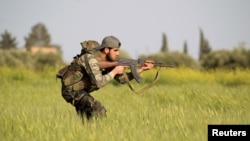The president and the Pentagon appear to be on different pages this week concerning the training of Syrian rebels.
After meeting with his national security team, U.S. President Barack Obama told reporters Monday he “made it clear” to his team that the U.S. “will do more to train and equip the moderate opposition in Syria.”
But on Wednesday, Pentagon spokesman Capt. Jeff Davis told reporters the military’s training plan remains the same, because “it’s more important to us to get it right than it is to rush it.”
'This is it'
When VOA pressed Davis to give specifics on the president’s statement that more would be done to train the Syrian rebels, he replied, “This is the more. This is it.”
“Right now, we’re committed to doing this program of training moderate opposition to ISIL and continuing with our air support of that effort,” Davis said, using one of the acronyms for Islamic State militants. “And that, for now, is the sum total of it.”
The U.S. military is currently training just 60 of the 7,000 Syrian rebels who volunteered for the program.
‘Stagnation’
Michael O’Hanlon, a senior fellow at the Brookings Institution, says the delayed training of moderate rebels in Syria and Sunni tribesmen in Iraq is hindering the fight against Islamic State extremists.
“We’re basically stuck. We’re in a state of stagnation in the advance of the strategy,” he said.
A defense official told VOA 1,700 volunteers have successfully completed the vetting process, but 5,000 volunteers are still waiting for the long vetting procedure to begin.
Defense Secretary Ash Carter has explained the low numbers of trained Syrian moderates as a result of two factors - the necessary willingness of the moderates to use their U.S. training to fight the Islamic State group and the U.S. vetting process, which one defense official referred to as “difficult and laborious.”




